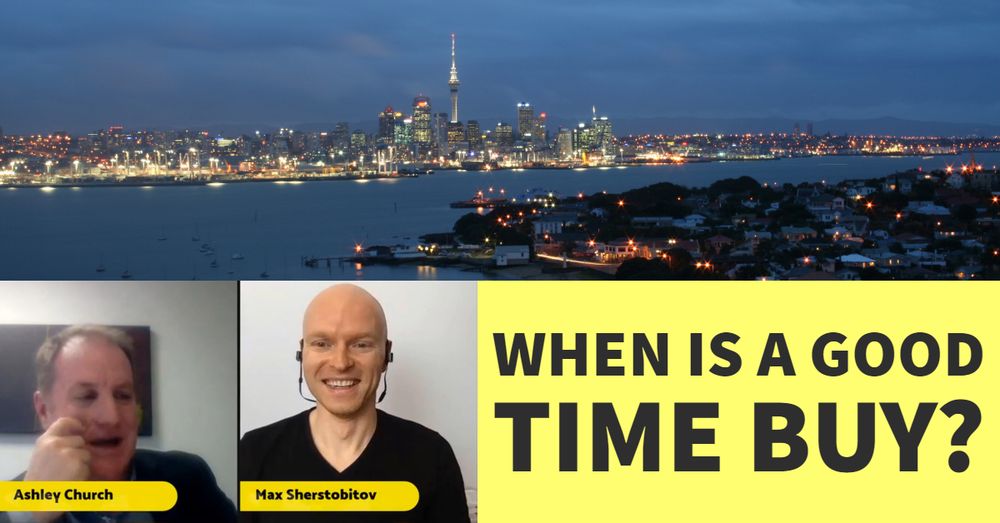YOU’LL LEARN:
- What are the 5 common mistakes that first-time property investors make
- Why it can be useful to hire a property manager
- The risks of buying property on emotions
- How important it is to find a balance between over- and under-committing
- What is the property investors’ association
- Why you need to understand the property cycles and behave accordingly
Max: Today we are talking about the 5 mistakes property investors make in their first few years. My name is Max. My guest today is Ashley Church from Property Institute of New Zealand.
Over the last 28 years, Ashley has provided regular opinion on political issues, residential property market and the economy. He substantially increased the media profile of the Institute.
Ashley also implemented a series of new initiatives like Property Industry Quality Assurance Program, monthly regional networks, New Zealand property professional magazine.
Let’s start with the 5 tips for property investors.
Ashley: Sure. When I talk about first-time property investors – or new property investors – I’m talking about people that bought an investment property in this current cycle that we’re just coming out of the other side of.
It includes anybody who bought an investment property after 2011-2012 when the market phase started taking off. That means there could be people that bought the property up to 5 years ago, but more likely those who bought it much more recently.
MISTAKE #1. MANAGE THE PROPERTY YOURSELF
Ashley: There are 5 things that I see as mistakes that people who are in that position make. The first of those mistakes is that they manage their own properties.
When you buy your first investment property, you may potentially buy a property manager. See that as a potential saving of money that you could be putting on to the bottom line.
I think in doing it, we often don’t recognize that there are quite specific skills that property managers have. Some property investors have as well, but it’s not necessarily a given that just because you own a property, you’re going to know how to run it.
The result of that is that we often have people who buy properties, try to manage them themselves and then realize that finding tenancy and the issues that go with the management of their property are more than they can handle.
There are many cases for first-time investors showing that it is actually enough to scare them out of the market and never to return.
The first mistake is trying to manage their own property when, in many cases, they are not suited for that as property investors and they should be using qualified property managers to do that.
Max: Can I ask a question about this property management? How can you find a suitable property manager? What sort of skills do you look into when you consider a professional?
BONUS TIPS #1. FINDING A GOOD PROPERTY MANAGER
Ashley: The first thing most people look for is cost, which is probably a mistake. People are trying to find the cheapest property manager that they can with respect to their percentage.
I might be much more inclined to look for a repeatable company that has some size. The company that has property managers who had been in the industry for a reasonable period. People who understand the market, know how to select a tenant, how to manage a tenant, how to get action if they require to do.
While I’m a great fan of entrepreneurs and people who are trying to set up new businesses, it’s pretty risky to use somebody who has just established a relatively new business in the property management. It’s better to be looking for somebody who’s got some credibility.
I would also tend to be focusing on independent property managers – those are people who aren’t attached to real estate firms. I would like to work with a firm that specializes in just property management and doesn’t have other profile activities going on.
Max: Would you say it is a benefit – or a must – to have a property manager that is also a property investor?
Ashley: I don’t think that’s a necessity. Again, the skills that a property manager has aren’t necessarily skills that are related to the ownership of a property.
I guess if somebody does have property, it’s not going to hurt, but there would be other criteria. I’m much more concerned about longevity and focus on property management as a skill set.
I’m just looking for a property manager or a property management company that has been around for a period and knows what it’s doing.
MISTAKE #2. BUY ON EMOTION
Ashley: The second mistake is buying on emotion. That’s a very-very easy thing to do, mainly, when there’s a couple involved.

Ashley: We tend to look at the property based on what we would live in and how we would want the property to be. It itself could be a mistake.
The even bigger mistake is when – while buying an investment property – we look to make innovations and changes to the property that would bring it up to the standard that we would require.
There is a couple of reasons why that is a problem. First, it can involve you considerably more costs than would be necessary.
Secondly, often it means bringing the property to a particular style that we might like, but that doesn’t necessarily get the appeal to the market.
We need to remember that when we buy an investment property, it’s a business. The property should be comfortable, fit for papers; it should meet all the regulations etc.
But just because we don’t like that the sun goes through a particular window etc. – it doesn’t mean that this property is not going to be a very good rental and that somebody is not going to love it and treat it as a home for some period.
We need to remove the emotion and look at it as a business; treat it as only numbers and not on the emotional decision that we might like to have when we’re buying a property for ourselves.
Max: I was recently thinking about the emotions – how useful it is and how affective it is in the property investment. I know what you are talking about when you’re saying “concentrate on the numbers”. But at the same time, you want to rent it out to other people. So you should like the property, it has to be livable.
Ashley: That’s true. But your taste is not going to be the same as somebody else’s – that doesn’t necessarily follow. Just because you might like something doesn’t necessarily mean that somebody else is going to have the same emotional attachment to that property as you do, because you’ve made those changes.
You can spend a considerable amount of money renovating a bathroom or a kitchen to a style that you like only to find out that when people come through they hate it because it’s not their taste.
If I’d be to treat those maintenance issues over a period of time – once you’ve got a feel for how that property rents, then you can have an emotional connection, which causes you to spend money or to buy a property on the basis of things that you think are important.
The numbers are what matters, whether it’s going to stack up as a business proposition and whether it makes the standard requirements that you would want of a rental investment property.
It’s a really easy mistake to make, and that’s the one we often get caught up in. As I say, it can cost money and, in some cases, it can cost tenancies.
Max: What are your number one requirements or items that you look for when you buy? If it’s not an emotion, then what are you going to base it on?
Ashley: My requirements tend to be around maximization of the return on the property.
I’m looking for properties that are getting a maximum rental, where when the market is going well there is reasonable capital growth, and where the maintenance that might be required on that property is in the minimum. Not just when I buy it, but on an ongoing basis.
For me, those are the big ones because they all involve costs and the expenditure of money. I’m not particularly concerned about whether the kitchen or the bathroom is up to the latest standard; as long as they fit for papers, and they are going to be comfortable for people – those are the nice properties.
Max: Let’s discuss the mistake number three.
MISTAKE #3. OVERCOMMITTING YOURSELF
Ashley: The third thing that first time investors do is they overcommit themselves. They go into the market, they get a bit of capital growth, and they get their property increase.
They are very excited about the fact that they suddenly get all the liquidity, and they can use that as leverage to go and buy another property. Constrained by the —

Ashley: They go out, they buy themselves another property, they get themselves ad hoc right up to the maximum, and they leverage themselves up to the limit of their ability to service.
In the market terms – interest rates go up, or the cycle ends, and the capital growth ends, and suddenly they find themselves with an asset, which suddenly costs them more than they anticipated.
If they committed themselves too much, that asset might actually become unaffordable. The extreme example of this is they have to sell.
Over-commitment is a very easy mistake to make in a rapidly rising market. But it’s very-very dangerous, and it can tip people over if they leverage themselves too high.
It indeed is a common mistake for first-time investors in their early years when their equity is increasing. But it can have deleterious consequences if they’re not very careful.
Max: What do you think is the safe number?
Ashley: That comes down to the individual. I don’t think there’s any magic number. I believe that this figure will differ from person to person.
Particularly in the market like Auckland, I’d be making sure that after I’m going to be associated with a property, I still have a pretty comfortable buffer regarding income.
The other thing that happens as a result of this commitment is that there’s a significant maintenance issue that happens to the property after you purchased it.
If you haven’t made provision for that, if you put yourself too high – that’s often enough to tip you over and put you into a position where you will be forced to sell the property.
You need to be looking for a little bit of a comfort zone to make sure that there’s enough aside; that if something unexpected happens – interest rate increase, maintenance issue – you are going to be able to handle it without it tipping you over.
Max: Are there any things that property investors can do to insure themselves? To use an overdraft facility or any other tools?
BONUS TIPS #2. ENSURING YOUR POSITION ON THE MARKET
Ashley: Yes. If you have developed some equity and you haven’t used all of that equity to purchase another property, then the existence of that equity – or be it your independent income – obviously will give you the ability to have that sort of facility put aside through the bank.
It’s what I’m not recommending to people – to go and borrow money to service maintenance on a property.
The comfort of actually having that is the knowledge that if something would have happened, you could cover it within the context of the asset that you have. It’s pretty reassuring.
Sadly a lot of first-time investors, in particular, think that the sky is always going to be blue, the market is always going to go in the same direction.
There’s a substantial risk, and when things turn on them, they find out that they are not on the position to be able to do anything to cover themselves.
Max: Ashley, what do you think about the fact that the banks have already accounted for the rate increase.
I think most of the applicants – correct me if I’m wrong – when they apply and get approval, they have the safety net of – I think it’s 2%, isn’t it?
Ashley: There is an element of truth in this. But I wouldn’t be consigning my future to the bank’s calculations. I wouldn’t be assuming that it’s okay just because the bank says so; I’d prefer to look on my own.
In my case, I entirely interrogate the hell out of my numbers and extract the maximum possible information, so I know very clearly what my position is going to be in any given time, not just today but profiling it for about a year.
I’m a very merchant to making sure I understand those numbers, and I understand what the consequences of unexpected chunks are. Not everybody has that as a skill set.
Again, if you are not somebody that’s good at budgeting or profiling a long way hidden terms of your financial position – you need to be doing things that mitigate against those shots.
For me, it’s about making sure that you reduced that risk to a level that you know you can manage that even if something were to happen.
Your point is a good one, Maxim, but I don’t think I would be trusting the banks as they calculate whether or not I could afford that asset.

Max: Thank you. Ashley, what’s the mistake number 4?
MISTAKE #4. UNDER COMMITTING YOURSELF
Ashley: Mistake number 4 is going to sound like a contradiction given what I just said.
The other mistake you can make is under-committing. Here is why. The market is going strong, particularly if you bought a property 4-5 years ago. Your property – or even a couple of properties – is going up quite substantially over that period.
The mistake is not taking advantage of the opportunity to leverage while the market is strong and getting that capital growth. That might sound a little bit hypocritical given what I’ve just told about not overcommitting yourself.
But there are people in pretty strong positions, they have good equity in their properties and good incomes, have the ability to service, and do have some leverage unaccounted.
For those people I’d be suggesting to look pretty hard at their numbers to see whether they have the ability to purchase another property or not, that still comes back to what I said about not overcommitting.
There’s a balance between the two. Don’t put yourself in the position where you’re going to tip over if the interest rate goes up or if there’s an unexpected surprise.
But at the same time don’t be so cautious and so conservative that you don’t take advantage of the opportunities that are available to you.
It’s finding a balance between those two things, which I think is crucial for property investors.
Max: How do the first-time investors work it out? Do they go to an accountant, a property coach? Where do they get this knowledge?
BONUS TIPS #3. PROPERTY INVESTORS ASSOCIATION
Ashley: The first thing – they go to the property investors association. They are going to be surrounded by people that have been on the market for a long time and know all the stuff, all the tricks, all the mistakes. Yes, they do need to have a good accountant, and a good financial broker and those other people.
But for me, by far the most important group of people that they do have to meet are those people that are members of their local property investors association. Those people are on the market, and they’ve been doing it for a long time.
Max: Any particular association you can recommend?
Ashley: Any association linked to the Property Investors Federation. As far as I’m aware – and I might be wrong – I think there’s only one in New Zealand is a north affiliate of the Federation, that’s the one in Wellington. Around the west of the country, I think they’re all a part of the Federation.
I’d be encouraging people to join one of those groups and get to know people. Mainly right now when the market is flattened off, and it’s going to be flat for some time.
There’ll be a lot of first time investors for whom this is the first time they’ve seen the market flattening. For some of them – because they don’t necessarily understand what’s going to happen to the market over these few years – this is quite a scary time.
This is a critical time to be getting a talk with a group or an association, going and talking to the members of the association and just finding out what they can expect over the next few years.
Max: Speaking of the current market, do you think it is a good time to invest? Or are you waiting and seeing what’s going to happen in the next few months?
Ashley: My standard position is that it’s always a good time to invest whether the market’s high or low. There are different reasons why it’s a good time to invest depending on the level of the cycle. To be honest, probably right now – because prices are not going to go up anytime soon – I might be waiting.
In Auckland – there are some other parts of the country where there’s still a little bit of a capital growth – I’ve been waiting at the moment just to get a bit of a hint of what is going to happen in the next 12 to 18 months before I made another decision.

Ashley: However, if you’re in the position when you’ve got strong equity and an opportunity comes up – sure. In fact, one of the good things about buying right now is that you can negotiate on price, it’s bigger than it’s been in the last 5-6 years.
Max: What about the mistake number 5?
MISTAKE #5. GIVE UP TOO SOON
Ashley: The last one – and it’s probably the most important and the biggest mistake the first time property investors can make – they give up too soon.
What I mean by that is if you purchased the property in the last 4-5 years, as I said a few moments ago this would be the first time you see the downturn.
For those of us that have been around for a long time, we know how the market works – if I take Auckland as an example, the cycle lasts roughly 10 to 11 years.
As a rule, in 10 or 11 year period – and there are exceptions to this – property will double in value. If you bought a property in the last 4-5 years, you’re now going into a flattening period. That flattening period we’re in right now could last anything between 3 and 4 years.
We may well be in a period where we don’t get the growth in the property, but there may be changes in interest rates upward.
There are also costs associated with the property, and if you don’t understand that, then you might well look at the market and be like “Oh, my God, I bought this property, it’s not going up in value, it costs me money, it’s about to cost me more, I might need to get out of this really quickly”.
That’s what I mean when I say they give up too soon. For those who understand the market, they recognize this is the part of the cycle, and so they will hang in there.
They might rearrange their portfolio – but, as a general rule, they’ll hang in there for that period, because they will recognize the flattening period that we are now in.
Depending on which numbers you believe on, the market is probably going to peak up again in 2021-2022. And that cycle continues way up until 2026 which will be the peak of the next cycle.
BONUS TIPS #4. UNDERSTANDING PROPERTY CYCLES
Ashley: For people who don’t understand – again solid reason to go and talk to the members of your property investors association, find out how cycles work, do a little bit of research of the last 3-4 cycles.
If you go back to New Zealand history, the cycles are very predictable. You can go right back to the late 70s – early 80s. The property cycle in New Zealand – regardless of international events – is very predictable.
There are reasons to believe that it continues to be predictable in the future. No guarantees of course, but pretty strong reasons to think that the market will continue to do what it’s done over the last 50 years.
Max: If the rates are bound to go up, then costs are going up as well. Wouldn’t it mean otherwise, the prices on properties are supposed to get down?
Ashley: Well, you would think so. But when I first invested in property back in the early 80s, at that time the interest rate was rising pretty hard, but the property still went up in value, even in the 90s. The evidence of the market is that regardless of what happens, the market absorbs those changes and continues to do what it does.
All I can refer back to is the graph that essentially tracks what’s happened to the market over that period. Basically what happens is it goes up for 5-6 years, it flattens off, it stays flat for a 3-4 year period, and then it goes up again. And it’s done that remarkably consistently for a very long period. Could that change? Yes, it could.
One thing that’s different now and that didn’t exist in previous markets is that gap between salaries and prices. Wages are going up, but house prices are increasing even more quickly. That gap is getting more pronounced.
If you go back to the early 2000s, it cost about 4.2 times the average salary in Auckland to buy a house; that went up to 9.2 times. That gap is getting bigger; it must come to a point where it gets unsustainable, but we’re not there yet. There’s nothing to suggest; we will have another cycle or two before we reach that point.

Max: Ashley, what do you think are the main reasons that will make the property prices go up? I can see only the negatives: the interest rate is growing up, the investments are going down.
Ashley: Interestingly, you can land a strong argument and say that over the last 50 years of those cycles the growth in those prices has been largely driven by speculations in market confidence.
This market is different. The prices are driven much more by demand. There’s immigration – over the last 5-6 years we’ve built cities in size of Hamilton, year after year. And it’s not going down quickly. That’s going to continue for some period of time because people need to be housed.
Another thing that’s happened – and there’s a fascinating relationship going back to the cities in 1996 and 2013 – the level of occupancy in New Zealand homes has dropped quite dramatically; it’s dropped from about 3,5 to 2,8-2,9 people occupying a house.
Now, the reason why it is important – it tells us that even if there is no immigration, if no new people are coming to the country – we need more houses just to house the people that live in New Zealand.
We’ve got both of those things just pressing down on the market. All of those figures tell us the same thing – there’s a shortage of houses, and we need those houses to be built. There is nothing in the market to indicate that this pressure is going to disappear any time soon.
Max: How does your strategy have changed over the last years? Or is it the same?
Ashley: It’s more of the consolidation at the moment. I’m looking at my portfolio at the moment and thinking about whether I change it to properties that are least focused on capital growth and more focused on cash flow.
That’s the decision I’m making consultations with some people over the next 12 months. That’s a smart strategy in the market, where capital growth is low or non-existent.
But the flip side of that, of course, is if you do that when the market takes up again, you will run the risk of missing all the capital growth.
Again that comes back to what I said earlier on – it is about making sure that whatever decision you make, you’re in a position to sustain any changes that can happen on the market over the next 4-5 years.
Max: How do you maximize your capital growth or rental yield at this type of cycle?
Ashley: Mainly you capitalize rental yield by buying properties in areas that are the parts of the country, where the capital growth is lower.
As the result of that the rental return on that property is a proportion of the total value; if that property is going to be higher, then your yield is higher. The other part of the equation of how do you maximize your capital growth – you wait for 5 years until the market peaks up again.
There is a little bit of capital growth in other parts of the country; Auckland is pretty much downstage. It’s all a little bit of residual capital growth which is just the reflection of the effect that those markets came into the cycle later than Auckland, so they’re lasting a little bit longer.
But they will be all gone over the next 12-18 months. At that point, capital growth would be a thing in the past for a while. But it will come back; it’s just going to take some time.
Max: I see. Do you still believe in the Auckland market? Are you investing mainly in Auckland?
Ashley: Yes, in Auckland, keeping in mind that it’s getting harder and harder to be an investor in the Auckland market because of that gap I talked about before.
It’s getting more and more challenging to buy properties where the costs associated with owning that property are on the board. But the capital growth is always going to be stronger in Auckland than in other parts of the country.

Ashley: And it’s where people want to live. When people come to New Zealand, 40% of immigrants settle in Auckland; it’s just a very safe market in respect to what you can expect to happen to it.
You know, I talked about capital growth as a feature of the market over the last 50 years – there never was a time when Auckland and New Zealand were such desirable locations.
New Zealand has now true international cities, one of the most desirable cities, places where people want to live. There are no suggestions this situation is going to change any time soon. For me, it’s a pretty safe place in respect to where it’s likely to go over the next 15-20 year period.
Max: Thank you, Ashley, for your tips. Is there any website or anything you would like to share, how people can contact you? Do you want to promote anything? It’s a good time.
Ashley: You’re very welcome to contact me, my email address is ashley@property.org.nz. One of my great passions is talking to people about this stuff and giving them advice. If anybody wants to contact me, they’re very welcome to do so. I’ll give my opinion and my full and frank advice with respect to their position.
Especially, first-time investors, people that have been in the market for a short period. Because now it’s a scary time right now for some of those people, and it’s going to remain like that for 2-3 more years.
Max: Thank you very much. I appreciate your time, Ashley. We’d love to have you again sometime in the future.
Ashley: Thank you.
P.S. Do you know of other people that will find this article useful? Please share it on social media. Thank you!
